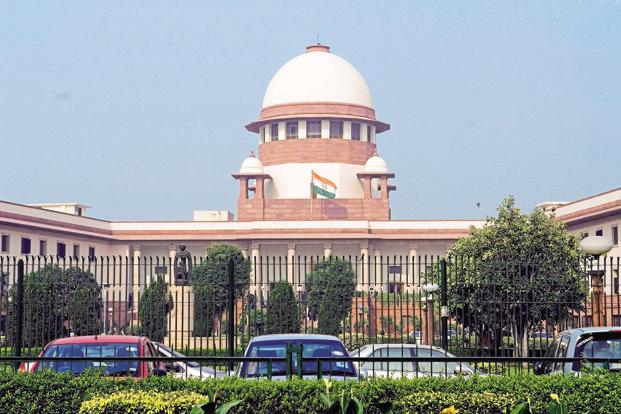Court’s duty to strike down law if it violates fundamental right in India
Court’s duty to strike down law if it violates fundamental right in India

NEW DELHI: Raising hopes for those seeking decriminalisation of consensual gay sex, the Supreme Court of India asserted that courts cannot wait for a “majoritarian government” to decide on enacting, amending or striking down a law if it violates fundamental rights.nnHearing a clutch of pleas challenging the validity of section 377 of the IPC, a five-judge Constitution bench headed by Chief Justice Dipak Misra, however, made clear that it may not strike down the law completely and deal with it to the extent it relates to consensual acts between two adults.nn”If section 377 of the IPC goes away entirely, there will be anarchy. We are solely on consensual acts between man-man, man-woman. Consent is the fulcrum here. You cannot impose your sexual orientation on others without their consent,” the top court said while allaying apprehensions of those opposed to the decriminalisation of the penal provision.nn”We would not wait for the majoritarian government to enact, amend or not to enact any law to deal with violations of fundamental rights,” the bench, which also comprised justices R F Nariman, A M Khanwilkar, D Y Chandrachud and Indu Malhotra, said while reserving the verdict on the petitions seeking decriminalisation of consensual gay sex.nnThe observations came when lawyer Shyam George, appearing for Apostolic Alliance of Churches and Utkal Christian Association, said that it was not the job of the court and rather it fell under the domain of the legislature to decide whether to enact, amend the existing law as the decriminalising it would have the impacts on many other statutes which deal with matrimonial and civil rights of men and women.nnQuoting from a US verdict in the case of the West Virginia Board of Education versus Burnette, Justice Nariman said, “The moment something is brought to our mind that there was violation of fundamental rights, it is our duty to strike that down.”nn”The whole object of the fundamental rights chapter is to give power to court to strike down laws that majoritarian governments do not touch due to political considerations. We are not bothered about what government does. They may enact, repeal, do whatever they want. It is our duty to uphold fundamental rights,” Justice Nariman said.nnSection 377 refers to ‘unnatural offences’ and says whoever voluntarily has carnal intercourse against the order of nature with any man, woman or animal, shall be punished with imprisonment for life, or with imprisonment of either description for a term which may extend to 10 years, and shall also be liable to pay a fine.nnAt the outset, George referred to the provision and said that it did not deal with the consent as the unnatural sexual activity was against the “order of the nature”.nn”What is the ‘order of nature’? Is it only ‘order of nature’ if sex is meant for procreation? Every sexual act which does not lead to procreation is against the order of nature for you,” the bench asked.nnIt referred to the case of UK scientist Alan Turing and said that homosexuals in that country were chemically castrated as an alternative to prison and Turing might have committed suicide because of that.nn”Fortunately, in our country there are no such convictions under section 377 of the IPC,” the lawyer said.nnThe bench was not in agreement with the submissions of George and senior advocate K Radhakrishnan, appearing for NGO Trust God Ministries, that homosexuality promoted AIDS.nnThe public acceptance that people live in gay relationships will help meet health concerns, spread of HIV and the homosexuals, who live in denial with no access to medical care, are more in danger to contract and spread AIDS, the bench said.nnIt also gave the illustration of a village women attracting the AIDS through their husbands who worked as migrant workers, the bench, adding that unsafe sex led to such diseases and not the homosexual relationships.nn”If you licence prostitution, you control it. If you shove it under the carpet, owing to some Victorian-era morality, it will only lead to health concerns. All prohibition is wrong,” the bench said.nnGeorge also referred to the term “sexual orientation” and said it cannot be read interchangeably with the term “sex” used in article 14 and 15 which deal with the right to equality of the citizen.nnHe said the term sexual orientation was different from the term sex as there have been several kinds of sexual orientation, besides the LGBTQ (lesbian, gay, bisexual, trans gender and queer).nnThe top court had on July 12 said the social stigma and discrimination attached to the LGBTQ community would go if criminality of consensual gay sex is done away with, while maintaining that it would scrutinise the legal validity of section 377 of the IPC in all its aspects.nnEarlier, the government had left it to the apex court to test the constitutional validity of section 377, urging that issues like gay marriages, adoption and ancillary civil rights of LGBTQ should not be dealt by it.nnThe bench had said it would test the validity of the law in relation to the consensual sexual acts of two adults and if it decides to strike down the penal provision then it would remove “ancillary disqualification” of LGBTQ community members which can join services, contest elections and form associations.nnSource: Press Trust of India





